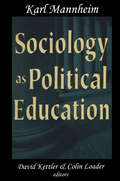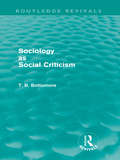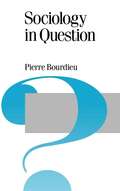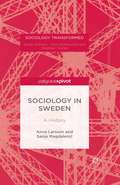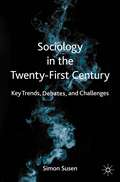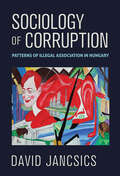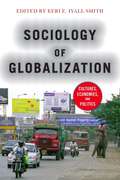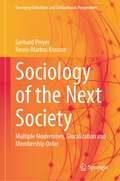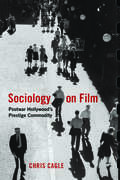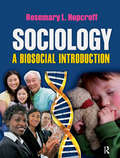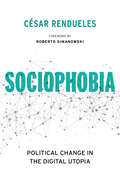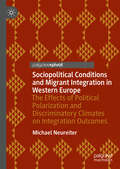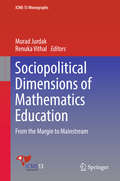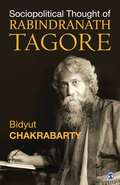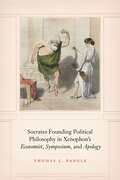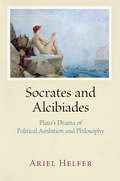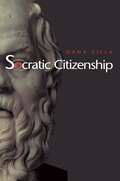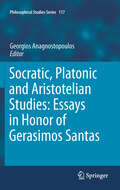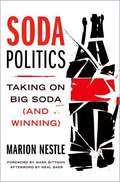- Table View
- List View
Sociology as Political Education: Karl Mannheim in the University
by Karl MannheimGerman professors and academic intellectuals are often blamed for passivity or complicity in the National Socialist rise to power. Karl Mannheim was a leading representative of a vital minority of university personalities who devoted themselves to making sociology and higher education contribute to democratization. Sociology as Political Education is both an analytical account of Mannheim's efforts as well as an illustration of the application of sociological knowledge to the world of practical action. Together with a second biographical volume by the editors, forthcoming next season, it comprisesa complete record of Karl Mannheim in the university life of the Weimar period.The comparatively new discipline of sociology was looked upon with favor by the Weimar Republic's reformers of higher education. In advancing its methods Mannheim had first to contend first with prominent and influential figures who attacked sociology as a mere political device to undermine cultural and national values for the sake of narrow interests and partisanship. He then had to meet the objections of fellow sociologists who were convinced that the discipline could prosper only as an area of specialized study with no claim to educational goals beyond the technical reproduction. Finally, he had to separate himself from proponents of politicized sociology. Sociological thought should be rigorous, critical, and attentive to evidence, but, Mannheim argued, its system had to be open and congruent with the ultimate responsibility of human beings for their acts.Loader and Kettler supplement Mannheim's groundbreaking volume with previously untranslated Mannheim texts, among them a transcript of his 1930 sociology course in which Mannheim answered his critics and clarified his intentions. Sociology as Political Education is not only of historical significance, but also shows Mannheim's relevance for current discussions of academic integrity and politicization. This volume will be of interest to sociologists, cultural historians, and political scientists.
Sociology as Social Criticism (Routledge Revivals)
by Tom B. BottomoreFirst published in 1975, this collection of essays embodies a conception of sociological thought as a critical analysis of social theories and doctrines, of social institutions and political regimes, of recent social movements. They deal, in particular, with some conservative versions of sociology and with attempts to develop more radical theories; they extend the author's previous writings on classes, elites and politics; and they analyse some of the problems of socialism in the late twentieth century. There is a close unity of theme througout the book in its critical attempt to formulate new intellectual bases for future radical and egalitarian politics. It is written with that quiet wisdom and impressive command of sources which readers have come to associate with Professor Bottomore's work.
Sociology in Question
by Pierre BourdieuThe works of Pierre Bourdieu occupy a central place in the current development of world sociology. This volume offers an accessible but challenging introduction to Bourdieu′s ideas. In a series of discussions, lectures and interviews, the range of Bourdieu′s ideas is laid out and its relation to other disciplines and other sociological schools is explored. The issues developed include the sociology of culture, leisure and taste; the intrinsic reflexivity of social science; and the role of language in society and social sciences.
Sociology in Sweden: A History (Sociology Transformed)
by Anna Larsson Sanja Magdaleni?This book offers a brief but comprehensive overview of the history of sociology in Sweden from the prewar period to the present day. It focuses in particular on scientific boundaries, gender and the relationship between sociology and the Swedish welfare state.
Sociology in the Twenty-First Century: Key Trends, Debates, and Challenges
by Simon SusenThis book examines key trends, debates, and challenges in twenty-first-century sociology. To this end, it focuses on significant issues surrounding the nature of sociology (‘What is sociology?’), the history of sociology (‘How has sociology evolved?’), and the study of sociology (‘How can or should we make sense of sociology?’). These issues have been, and will continue to be, essential to the creation of conceptually informed, methodologically rigorous, and empirically substantiated research programmes in the discipline. Over the past years, however, there have been numerous disputes and controversies concerning the future of sociology. Particularly important in this respect are recent and ongoing discussions on the possibilities of developing new – and, arguably, post-classical – forms of sociology. The central assumption underlying most of these projects is the contention that a comprehensive analysis of the principal challenges faced by global society requires the construction of a sociology capable of accounting for the interconnectedness of social actors and social structures across time and space. This book provides a cutting-edge overview of crucial past, present, and possible future trends, debates, and challenges shaping the pursuit of sociological inquiry.‘Simon Susen – one of the most knowledgeable scholars in the contemporary social sciences – examines the key challenges with which sociology is confronted today. This book is a must-read for professional sociologists as well as for those studying the subject.’ – Luc Boltanski, École des Hautes Études en Sciences Sociales, Paris, France‘Simon Susen provides a balanced update on sociology’s theoretical, methodological, and institutional resources as well as challenges in today’s complicated local and global social worlds. Fortunately, he has innovative and practical recommendations for ensuring the cutting-edge relevance of sociological thinking. This book is an excellent choice for undergraduate and postgraduate students as well as for the general reader.’ – Sandra Harding, University of California, Los Angeles, USA ‘A comprehensive and judicious account of the intellectual and material state of sociology, based on omnivorous reading and incisive analysis. The writing is beautifully clear, and the book is a major contribution to the self-understanding of the discipline.’ – William Outhwaite, Newcastle University, UK
Sociology of Aging and Death (International Perspectives on Aging #35)
by Jason PowellThis book presents a critical analysis and examination of the major theories and social issues in the social construction of aging and death. It is concerned with the impact of death and places how our experiences of death are transformed by the roles that truth and discourse about aging play in everyday life. A major element of the book is an examination of the way in which groups and individuals employ specific representations of mortality in order to construct meaning and purpose for life and death. To accentuate this, the book provides an investigation into the social construction of death practices across time and space. Special attention is given to the notion of death as a socially accomplished phenomenon grounded in a unique sociological introduction to the meaning of death throughout history to the present. The purpose of this book is to critically inform debates concerning the abstract and empirical features of death examined through the lens of sociological perspectives. This book explores the emergent biomedical dominance relating to ageing and death. An alternative is advocated which re-interprets ageing for Graduate schools. This innovative book explores the concept, history and theory of aging and its relationship to death. Traditionally, many books have focused on older people dying of 'natural causes', a biomedical explanatory framework. This book looks at alternative social theories and experiences with aging and relate to death in different countries, victims, crime, imprisonment and institutional care. Are these deaths avoidable? If so, what are the solutions the book addresses. This is one of the first books that re-interprets aging and its relationship of examples of death. It will be of essential reading for graduate students and researchers in understanding these different examples of aging and death across the globe.
Sociology of Corruption: Patterns of Illegal Association in Hungary
by David JancsicsIn Sociology of Corruption, David Jancsics provides a fresh approach to the study of corruption in Hungary, which once seemed to be the most likely of the ex-communist bloc nations to catch up to the West and is, according to many experts and scholars, a country with a highly corrupt dynamic.Based on data from 2022, Hungary is now the most corrupt member state of the European Union. There is also a consensus among experts that a small clique of corrupt political actors has captured most Hungarian state institutions and a significant portion of the business sector. What fostered corruption in Hungary? What are the most typical forms of corruption in this country? What do Hungarians think about it? What is the role of prime minister Viktor Orbán in this? Sociology of Corruption proposes a novel sociological theory of corruption focusing on social status and relationships, network structures, and power dynamics as important explanatory factors of corrupt behavior. Although his focus is on Hungary, Jancsics's findings are applicable to other nations and cultural contexts.
Sociology of Globalization
by Keri E. Iyall SmithA rich collection of diverse voices,Sociology of Globalizationexamines the processes of globalization as well as its impact on people around the world. It looks beyond the headlines, stereotypes, and hype and features a balanced selection of classic scholarship and theory, cutting-edge research, and engaging journalism. Key pieces from prominent scholars, journalists, and theorists will resonate with students, stretch the classroom into their daily lives, and give the study of globalization concrete meaning. Each of three sections-culture, economy, and politics-begins with an original introduction from the editor which familiarizes readers with essential themes and concepts and provides necessary context for the readings that follow. Useful resources for further research, including websites, films, and class exercises, are also provided to exemplify and add relevance to major topics. Accessible and expansive, this is the ideal primary reader or supplement for undergraduate courses on the sociology of globalization.
Sociology of Globalization
by Keri E. Iyall SmithA rich collection of diverse voices, Sociology of Globalization examines the processes of globalization as well as its impact on people around the world. It looks beyond the headlines, stereotypes, and hype and features a balanced selection of classic scholarship and theory, cutting-edge research, and engaging journalism. Key pieces from prominent scholars, journalists, and theorists will resonate with students, stretch the classroom into their daily lives, and give the study of globalization concrete meaning. Each of three sections--culture, economy, and politics--begins with an original introduction from the editor which familiarizes readers with essential themes and concepts and provides necessary context for the readings that follow. Useful resources for further research, including websites, films, and class exercises, are also provided to exemplify and add relevance to major topics. Accessible and expansive, this is the ideal primary reader or supplement for undergraduate courses on the sociology of globalization.
Sociology of Globalization
by Keri E. Iyall SmithA rich collection of diverse voices, Sociology of Globalization examines the processes of globalization as well as its impact on people around the world. It looks beyond the headlines, stereotypes, and hype and features a balanced selection of classic scholarship and theory, cutting-edge research, and engaging journalism. Key pieces from prominent scholars, journalists, and theorists will resonate with students, stretch the classroom into their daily lives, and give the study of globalization concrete meaning. Each of three sections--culture, economy, and politics--begins with an original introduction from the editor which familiarizes readers with essential themes and concepts and provides necessary context for the readings that follow. Useful resources for further research, including websites, films, and class exercises, are also provided to exemplify and add relevance to major topics. Accessible and expansive, this is the ideal primary reader or supplement for undergraduate courses on the sociology of globalization.
Sociology of Interdisciplinarity: The Dynamics of Energy Research
by Chris Foulds Antti SilvastThis Open Access book builds upon Science and Technology Studies (STS) and provides a detailed examination of how large-scale energy research projects have been conceived, and with what consequences for those involved in interdisciplinary research, which has been advocated as the zenith of research practice for many years, quite often in direct response to questions that cannot be answered (or even preliminarily investigated) by disciplines working separately. It produces fresh insights into the lived experiences and actual contents of interdisciplinarity, rather than simply commentating on how it is being explicitly advocated. We present empirical studies on large-scale energy research projects from the United Kingdom, Norway, and Finland. The book presents a new framework, the Sociology of Interdisciplinarity, which unpacks interdisciplinary research in practice. This book will be of interest to all those interested in well-functioning interdisciplinary research systems and the dynamics of doing interdisciplinarity, including real ground-level experiences and institutional interdependencies.
Sociology of the Next Society: Multiple Modernities, Glocalization and Membership Order (Emerging Globalities and Civilizational Perspectives)
by Gerhard Preyer Reuss-Markus KrausseThis innovative volume provides insight into the vast changes in societies now and in the near future, and highlights the need for a new sociological approach to analyse these changes. It particularly reviews and critiques existing theories of globalization and analyses how global changes affect all subsystems of social membership systems: the scientific, academic, legal and political systems. The authors propose a new theoretical paradigm in sociology to analyse this “next society”. The book studies emergent communication structures between these systems and looks at the concept of membership as a new research area in the study of the next society. In this context, it particularly assesses the problems of further modernization of Chinese society, and the directions of this modernization.This book is of interest to researchers and students of social theory, globalization studies, theory of evolution, and those studying modern Chinese society.
Sociology on Film: Postwar Hollywood's Prestige Commodity
by Professor Chris CagleAfter World War II, Hollywood’s “social problem films”—tackling topical issues that included racism, crime, mental illness, and drug abuse—were hits with critics and general moviegoers alike. In an era of film famed for its reliance on pop psychology, these movies were a form of popular sociology, bringing the academic discipline’s concerns to a much broader audience. Sociology on Film examines how the postwar “problem film” translated contemporary policy debates and intellectual discussions into cinematic form in order to become one of the preeminent genres of prestige drama. Chris Cagle chronicles how these movies were often politically fractious, the work of progressive directors and screenwriters who drew scrutiny from the House Un-American Activities Committee. Yet he also proposes that the genre helped to construct an abstract discourse of “society” that served to unify a middlebrow American audience. As he considers the many forms of print media that served to inspire social problem films, including journalism, realist novels, and sociological texts, Cagle also explores their distinctive cinematic aesthetics. Through a close analysis of films like Gentleman’s Agreement, The Lost Weekend, and Intruder in the Dust, he presents a compelling case that the visual style of these films was intimately connected to their more expressly political and sociological aspirations. Sociology on Film demonstrates how the social problem picture both shaped and reflected the middle-class viewer’s national self-image, making a lasting impact on Hollywood’s aesthetic direction.
Sociology: A Biosocial Introduction
by Rosemary L. HopcroftIn an era of human genome research, environmental challenges, new reproductive technologies, and more, students can benefit from an introductory sociology text that is a biologically informed. This innovative text integrates mainstream sociological research in all areas of sociology with a scientifically-informed model of an evolved, biological human actor. This text allows students to better understand their emotional, social, and institutional worlds. It also illustrates how biological understanding naturally enhances the sociological approach. This grounding of sociology in a biosocial conception of the individual actor is coupled with a comparative approach, as human biology is universal and often reveals itself as variations on themes across human cultures. Tables, Figures, Photos, and the author's concise and remarkably lively style make this a truly enjoyable book to read and teach.
Sociophobia: Political Change in the Digital Utopia (Insurrections: Critical Studies in Religion, Politics, and Culture)
by César RenduelesThe great ideological cliché of our time, César Rendueles argues in Sociophobia, is the idea that communication technologies can support positive social dynamics and improve economic and political conditions. We would like to believe that the Internet has given us the tools to overcome modernity's practical dilemmas and bring us into closer relation, but recent events show how technology has in fact driven us farther apart.Named one of the ten best books of the year by Babelia El País, Sociophobia looks at the root causes of neoliberal utopia's modern collapse. It begins by questioning the cyber-fetishist dogma that lulls us into thinking our passive relationship with technology plays a positive role in resolving longstanding differences. Rendueles claims that the World Wide Web has produced a diminished rather than augmented social reality. In other words, it has lowered our expectations with respect to political interventions and personal relations. In an effort to correct this trend, Rendueles embarks on an ambitious reassessment of our antagonistic political traditions to prove that post-capitalism is not only a feasible, intimate, and friendly system to strive for but also essential for moving past consumerism and political malaise.
Sociopolitical Conditions and Migrant Integration in Western Europe: The Effects of Political Polarization and Discriminatory Climates on Integration Outcomes
by Michael NeureiterThis book brings new insight from social psychology to explore migrant integration in Western Europe. Through a series of survey studies it illustrates the importance of sociopolitical conditions, such as political polarization and discriminatory climates, for understanding cross-national variation in migrant integration outcomes. The author investigates how migrants integrate; what factors facilitate or hinder successful integration; and how successes and failures along the way affect subsequent integration outcomes. An inspiring read for researchers and students alike interested in migration studies, political behaviour, social psychology, and international policy, this book aims to promote more effective migrant integration policies within the European Union and elsewhere.
Sociopolitical Dimensions of Mathematics Education
by Murad Jurdak Renuka VithalThis book documents and expands on the diverse social and political dimensions of mathematics education issues, concerns, perspectives, contexts, and approaches presented in Topic Study Group 34 of the 13th International Congress on Mathematical Education (ICME-13). The book also argues for and promotes the mainstreaming of the sociopolitical dimensions of mathematics education through an ongoing critique and inquiry into content, policies, practices and theories. Accordingly, the main theme throughout the book is captured and illuminated by bringing voices from the margin to the mainstream. In this respect it is both aspirational and a reality, as evidenced by the increasing references to the sociopolitical dimensions in other areas of mathematics education—for example, in several of the plenary presentations at the ICME-13. The authors have reflected on their ideas with a view to orienting and enhancing research in the sociopolitical dimensions of mathematics education that is grounded in current education systems within their specific sociocultural contexts.
Sociopolitical Thought of Rabindranath Tagore
by Bidyut ChakrabartyRabindranath Tagore, an icon of humanism and universalism who always privileged India’s argumentative traditions, remains a source of inspiration for humanity. However, Tagore’s social and political ideas appear to have received inadequate attention presumably because of the hegemonic influence of derivative Western ideas and thoughts. This is where Tagore stands out, not only as a poet but also a visionary who charted a course of action in tune with human betterment, cutting across all kinds of man-made barriers and customary restrictive social, economic and political practices. Socio-political Thought of Rabindranath Tagore presents a comprehensive and detailed analysis of the socio-political, socio-economic and ideological preference of Tagore, with emphasis on nationalistic, inclusive and gender development ideas. It shows that Tagore’s socio-political ideas continue to remain relevant not merely as a package for intellectual rejuvenation but also as a meaningful device for socio-economic transformation for the world.
Socrates Founding Political Philosophy in Xenophon's "Economist", "Symposium", and "Apology"
by Thomas L. PangleThe oeuvre of the Greek historian Xenophon, whose works stand with those of Plato as essential accounts of the teachings of Socrates, has seen a new surge of attention after decades in the shadows. And no one has done more in recent years to spearhead the revival than Thomas L. Pangle. Here, Pangle provides a sequel to his study of Xenophon’s longest account of Socrates, the Memorabilia, expanding the scope of inquiry through an incisive treatment of Xenophon’s shorter Socratic dialogues, the Economist, the Symposium, and the Apology of Socrates to the Jury. What Pangle reveals is that these three depictions of Socrates complement and, in fact, serve to complete the Memorabilia in meaningful ways. Unlike the Socrates of Plato, Xenophon’s Socrates is more complicated and human, an individual working out the problem of what it means to live well and virtuously. While the Memorabilia defends Socrates by stressing his likeness to conventionally respectable gentlemen, Xenophon’s remaining Socratic texts offer a more nuanced characterization by highlighting how Socrates also diverges from conventions of gentlemanliness in his virtues, behaviors, and peculiar views of quotidian life and governmental rule. One question threads through the three writings: Which way of life best promotes human existence, politics, and economics—that of the Socratic political philosopher with his philosophic virtues or that of the gentleman with his familial, civic, and moral virtues? In uncovering the nuances of Xenophon’s approach to the issue in the Economist, Symposium, and Apology, Pangle’s book cements the significance of these writings for the field and their value for shaping a fuller conception of just who Socrates was and what he taught.
Socrates and Alcibiades: Plato's Drama of Political Ambition and Philosophy
by Ariel HelferIn the classical world, political ambition posed an intractable problem. Ancient Greek democracies fostered in their most promising youths a tension-ridden combination of the desire for personal glory and deep-seated public-spiritedness in hopes of producing brilliant and capable statesmen. But as much as active civic engagement was considered among the highest goods by the Greek citizenry, the attempt to harness the love of glory to the good of the city inevitably produced notoriously ambitious figures whose zeal for political power and prestige was so great that it outstripped their intention to win honor through praiseworthy deeds. No figure better exemplifies the risks and rewards of ancient political ambition than Alcibiades, an intelligent, charming, and attractive statesman who grew up during the Golden Age of Athens and went on to become an infamous demagogue and traitor to the city during the Peloponnesian War.In Socrates and Alcibiades, Ariel Helfer gathers Plato's three major presentations of Alcibiades: the Alcibiades, the Second Alcibiades, and the Symposium. Counter to conventional interpretation, Helfer reads these texts as presenting a coherent narrative, spanning nearly two decades, of the relationship between Socrates and his most notorious pupil. Helfer argues that Plato does not simply deny the allegation that Alcibiades was corrupted by his Socratic education; rather, Plato's treatment of Alcibiades raises far-ranging questions about the nature and corruptibility of political ambition itself. How, Helfer asks, is the civic-spirited side of political ambition related to its self-serving dimensions? How can education be expected to strengthen or weaken the devotion toward one's fellow citizens? And what might Socratic philosophy reveal about the place of political aspiration in a spiritually and intellectually balanced life? Socrates and Alcibiades recovers a valuable classical lesson on the nature of civic engagement and illuminates our own complex political situation as heirs to liberal democracy's distrust of political ambition.
Socratic Citizenship
by Dana VillaMany critics bemoan the lack of civic engagement in America. Tocqueville's ''nation of joiners'' seems to have become a nation of alienated individuals, disinclined to fulfill the obligations of citizenship or the responsibilities of self-government. In response, the critics urge community involvement and renewed education in the civic virtues. But what kind of civic engagement do we want, and what sort of citizenship should we encourage? In Socratic Citizenship, Dana Villa takes issue with those who would reduce citizenship to community involvement or to political participation for its own sake. He argues that we need to place more value on a form of conscientious, moderately alienated citizenship invented by Socrates, one that is critical in orientation and dissident in practice. Taking Plato's Apology of Socrates as his starting point, Villa argues that Socrates was the first to show, in his words and deeds, how moral and intellectual integrity can go hand in hand, and how they can constitute importantly civic--and not just philosophical or moral--virtues. More specifically, Socrates urged that good citizens should value this sort of integrity more highly than such apparent virtues as patriotism, political participation, piety, and unwavering obedience to the law. Yet Socrates' radical redefinition of citizenship has had relatively little influence on Western political thought. Villa considers how the Socratic idea of the thinking citizen is treated by five of the most influential political thinkers of the past two centuries--John Stuart Mill, Friedrich Nietzsche, Max Weber, Hannah Arendt, and Leo Strauss. In doing so, he not only deepens our understanding of these thinkers' work and of modern ideas of citizenship, he also shows how the fragile Socratic idea of citizenship has been lost through a persistent devaluation of independent thought and action in public life. Engaging current debates among political and social theorists, this insightful book shows how we must reconceive the idea of good citizenship if we are to begin to address the shaky fundamentals of civic culture in America today.
Socratic and Platonic Political Philosophy
by Christopher P. LongIn the Gorgias, Socrates claims to practice the true art of politics, but the peculiar politics he practices involves cultivating in each individual he encounters an erotic desire to live a life animated by the ideals of justice, beauty and the good. Socratic and Platonic Political Philosophy demonstrates that what Socrates sought to do with those he encountered, Platonic writing attempts to do with readers. Christopher P. Long's attentive readings of the Protagoras, Gorgias, Phaedo, Apology, and Phaedrus invite us to cultivate the habits of thinking and responding that mark the practices of both Socratic and Platonic politics. Platonic political writing is here experienced in a new way as the contours of a politics of reading emerges in which the community of readers is called to consider how a commitment to speaking the truth and acting toward justice can enrich our lives together.
Socratic, Platonic and Aristotelian Studies: Essays in Honor of Gerasimos Santas
by Georgios AnagnostopoulosThis volume contains outstanding studies by some of the best scholars in ancient Greek Philosophy on key topics in Socratic, Platonic, and Aristotelian thought. These studies provide rigorous analyses of arguments and texts and often advance original interpretations. The essays in the volume range over a number of central themes in ancient philosophy, such as Socratic and Platonic conceptions of philosophical method; the Socratic paradoxes; Plato's view on justice; the nature of Platonic Forms, especially the Form of the Good; Aristotle's views on the faculties of the soul; Aristotle's functionalist account of the human good; Socratic, Platonic, and Aristotelian views on the nature of desire and its object. The volume will be of interest to students and scholars of ancient philosophy and classics.
Soda Politics: Taking on Big Soda (and Winning)
by Marion Nestle Mark Bittman Neal BaerSodas are astonishing products. Little more than flavored sugar-water, these drinks cost practically nothing to produce or buy, yet have turned their makers - principally Coca-Cola and PepsiCo - into a multibillion-dollar industry with global recognition, distribution, and political power. Billed as "refreshing," "tasty," "crisp," and "the real thing," sodas also happen to be so well established to contribute to poor dental hygiene, higher calorie intake, obesity, and type-2 diabetes that the first line of defense against any of these conditions is to simply stop drinking them. Habitually drinking large volumes of soda not only harms individual health, but also burdens societies with runaway healthcare costs. So how did products containing absurdly inexpensive ingredients become multibillion dollar industries and international brand icons, while also having a devastating impact on public health? In Soda Politics, Dr. Marion Nestle answers this question by detailing all of the ways that the soft drink industry works overtime to make drinking soda as common and accepted as drinking water, for adults and children. Dr. Nestle, a renowned food and nutrition policy expert and public health advocate, shows how sodas are principally miracles of advertising; Coca-Cola and PepsiCo spend billions of dollars each year to promote their sale to children, minorities, and low-income populations, in developing as well as industrialized nations. And once they have stimulated that demand, they leave no stone unturned to protect profits. That includes lobbying to prevent any measures that would discourage soda sales, strategically donating money to health organizations and researchers who can make the science about sodas appear confusing, and engaging in Corporate Social Responsibility(CSR) activities to create goodwill and silence critics. Soda Politics follows the money trail wherever it leads, revealing how hard Big Soda works to sell as much of their products as possible to an increasingly obese world. But Soda Politics does more than just diagnose a problem - it encourages readers to help find solutions. From Berkeley to Mexico City and beyond, advocates are successfully countering the relentless marketing, promotion, and political protection of sugary drinks. And their actions are having an impact - for all of the hardball and softball tactics the soft drink industry employs to maintain the status quo, soda consumption has been flat or falling for years. Health advocacy campaigns are now the single greatest threat to soda companies' profits. Soda Politics provides readers with the tools they need to keep up pressure on Big Soda in order to build healthier and more sustainable food systems.
Sofia Khan and the Baby Blues
by Ayisha MalikTHE AWARD-WINNING AUTHOR OF THE HILARIOUS ROMANTIC COMEDY SOFIA KHAN IS NOT OBLIGED'The perfect balance of romance and humour' INDEPENDENT'Fun, fresh and funny' MHAIRI MCFARLANE'A smart romcom . . . Huge fun' JENNY COLGANSofia Khan is going about everything the wrong way. At least, that's what her mother, Mehnaz, thinks. Sofia is twice-divorced, homeless and - worst of all - refusing to give up on a fostered baby girl. Sofia's just not behaving like a normal woman should.Sofia doesn't see it like that. She's planning to adopt Millie, and she's sure it'll be worth it. (Even if it means she and Millie have to stay at Mehnaz's place for a while.) And as Sofia finally begins to live the life she's chosen, she finds both romance and happiness start to blossom.But then someone comes back from the past - and not even Sofia's own past. Suddenly, she's faced with a choice. To do what's best for those she loves, Sofia might have to break her own heart. And she might find herself needing the last person she expected . . .** The anticipation is already building for Ayisha Malik's fiercely original and bold new book, THE MOVEMENT, coming spring 2022 **
